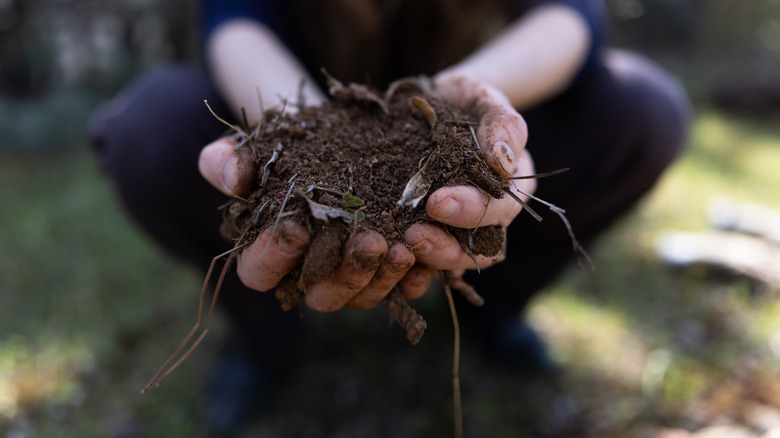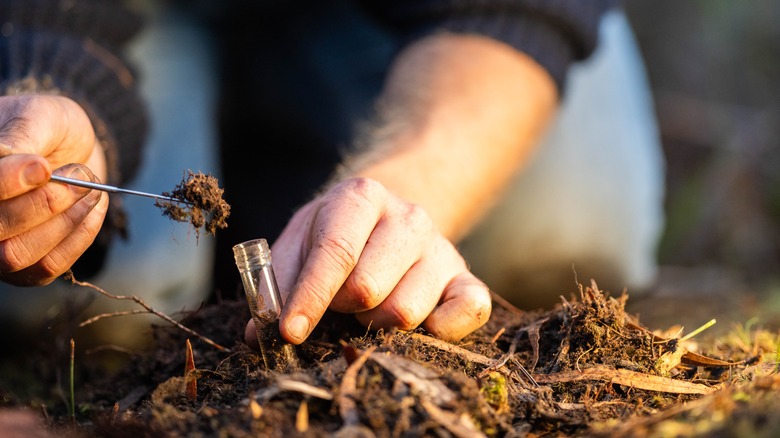How Your Tongue May Be The Best Way To Know If You Have High Quality Soil
You may be familiar with the concept of terroir, a practice pioneered in wine making — the soil the grape vines grow in affects the flavor of the wine. Observing, smelling, and feeling the quality, composition, and fertility of the soil in gardens are all well-established and respected practices, even if they're not considered highly accurate. Is it really such a stretch to think you could use your sense of taste as a dirt testing tool, too, much as you would sample a tipple? Tasting soil is frowned upon by most professionals, though some farmers and soil scientists don't discount the method entirely. Whether you, the urban, suburban, or even rural home gardener, should do it is heavily contested, especially when there are cheap soil tests readily available online and in nurseries.
Agriculturalists have been testing soil quality by taste for centuries. The Moors in North Africa would let freshly dug dirt settle and soak in a vessel of water, sipping from it after the soil dropped to the bottom. The ancient Romans performed similar tests on vineyard soil. When farmers of old needed to measure the pH of their soil, they would nibble a handful of field dirt. As odd as these techniques sound to our modern ears, they were all once considered an acceptable and, perhaps more importantly, informative practice. There must be something to the idea, otherwise scientists wouldn't be pouring resources into developing so-called "electronic tongues" (yup, you read that right) for soil analysis. Recently, artists and chefs are partnering with horticulturalists and soil specialists to put on soil tasting workshops where participants sip from glasses of dirt-soaked water and share insights.
Eating dirt is an inaccurate and unpalatable way to test soil quality
In an interview with Boston.com, Justin B. Richardson, assistant professor at the College of Natural Sciences UMass Amherst, said "Taste can tell you a bunch of things." He's talking about soil, of course, and advises having only a nibble. Likewise, modern farmer John Peterson tastes the dirt of his Illinois farm. "It's an old custom that preceded soil testing and apparently was a way that people evaluated their soil," he says, per Bioneers, though he admits it's more about habit and heritage than an easy way to tell if your garden soil is lacking in nitrogen. Then, there's the fact that geologists regularly taste dirt to test its composition — grittiness or lack of it tells you whether a soil sample is sandy or clay-based, for example. Other proponents say sour, bitter soil indicates a low pH, while sweet notes are considered neutral.
Still hesitant to give it a go? We're not surprised. There's a reason why popular YouTuber and garden guru Gardener Scott promoted the idea as an April Fools joke in 2023! Tasting the soil isn't just, well, an unappetizing prospect. It's a scientifically inaccurate testing method and could even be harmful to your health. Garden dirt (boggy soil, in particular) might contain everything from parasites to bacteria and other potentially human-harming microbes, as well as heavy metals like lead. It's probably a better bet to turn to one of the many inexpensive, easily available store-bought, Extension program-supplied, or DIY tests to check the health of your soil.

